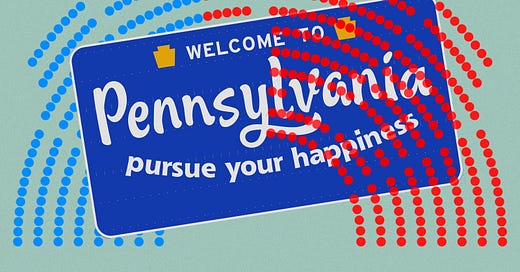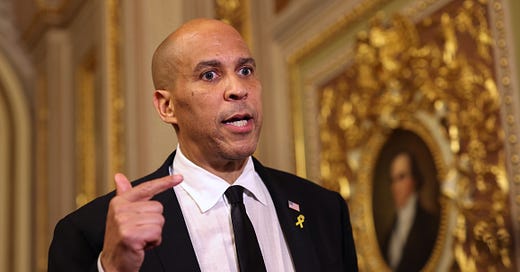
Quit asking President Trump if he will contest the 2020 election. He already is.
On Sunday afternoon, President Trump returned to one of his favorite conspiracies, tweeting that “the 2020 Election will be totally rigged if Mail-In Voting is allowed to take place, & everyone knows it.”
Meanwhile, his lawyers are suing Pennsylvania—a swing state that Trump won by only 44,292 votes in 2016—over its mail-in system. Last month, the Trump campaign launched a federal lawsuit against Pennsylvania and the election boards of all all its 67 counties. The suit claims that state election officials are “undermining ballot security through unmonitored by-mail voting” and choosing “a path that jeopardizes election security and will lead—and has already led—to the disenfranchisement of voters, questions about the accuracy of election results, and ultimately chaos heading into the upcoming November 3, 2020 General Election.”
Specifically, the Trump campaign and the Republican co-plaintiffs are objecting to changes that Pennsylvania made, on a bipartisan basis, last year to allow all Pennsylvanians to vote remotely, via ballots that can be returned by mail or to a county elections office. As a part of those changes, the secretary of state issued guidance in January that said counties “may provide for other secure ballot collection locations that the county deems appropriate to accommodate in-person return of voted mail-in and absentee ballots.” The guidance also instructed parties to contact the Department for further guidance about how to use “secure ballot collection receptacle[s] . . . designed for this specific purpose.” These are commonly known as “drop boxes,” which several other states also permit for ballot collection.
This should all be pretty straightforward. But President Trump claims he sees something nefarious afoot.
The Republicans’ complaint states, “This is all a direct result of Defendants’ hazardous, hurried, and illegal implementation of unmonitored mail-in voting which provides fraudsters an easy opportunity to engage in ballot harvesting, manipulate or destroy ballots, manufacture duplicitous votes, and sow chaos.”
If you didn’t catch it the first two times they mentioned it, the operative word is chaos.
Part of the “chaos” is real and stemmed from Democratic Governor Tom Wolf’s decision to extend the deadline for mailed-in ballots to arrive at election offices in six counties, where a state of emergency was declared in response to civil unrest and protests over the death of George Floyd. “The Governor of the Commonwealth issued an Executive Order the day before the June 2, 2020 Primary Election changing the rules of mail-in balloting, but only for some counties and not all,” the suit reads. If any governor tries to change election deadlines on such short notice when it comes to the presidential election this fall, you can pretty much bet that a partisan nuclear explosion will follow.
But what are we supposed to make of the Trump campaign’s arguments against mail-in ballots and drop boxes? What does it mean?
“These are attacks on the mechanism of voting that have worked for many years in other states,” said Suzanne Almeida, former executive director of the League of Women Voters of Pennsylvania and currently interim director of Common Cause Pennsylvania.
While the idea of ballot drop boxes might sound odd to those who haven’t used them, they are growing in popularity.
In Denver, Colorado, one of the nation’s five vote-by-mail states, 80 percent of the people who returned their ballots in 2016 did so by depositing their vote into a secure ballot drop box. The city posted a breakdown of the results, even ranking its “Top Performing 24-Hour Drop Boxes.” (If you’re wondering, the most-used spot was the Denver Museum of Nature and Science.) In Washington state, another universal vote-by-mail state, drop boxes are located at various places, such as libraries, shopping centers, police departments, and schools.
As COVID-19 fears rose last spring, more states expanded absentee voting rules and sought ways to install drop boxes to avoid unnecessarily exposing poll workers and voters to the virus.
Wisconsin got particularly creative. In March, the state elections commission issued a memo that mail slots at municipal facilities where residents submit tax or utility payments could be used to return ballots, as long as those slots were regularly monitored and collected daily. It even suggested that “book return slots at municipal libraries” be used.
The adoption of drop boxes didn’t appear to be a Democrat or a Republican idea, either.
Georgia’s state election board approved the use of drop boxes for its June 9 primary, provided they were located on government property, monitored by video cameras, and securely fastened in a way to prevent ballot tampering, damage, or removal. In Wayne County, Michigan, officials moved to install 60 drop boxes in libraries, firehouses, and community centers last month.
In Ohio, state Democratic party chairman David Pepper tweeted out a video over the weekend showcasing one of the drop boxes used last spring and called for more. “It’s made voting very easy—and especially easy, you’d think, in a pandemic this November when many people are going to want to vote, but they are going to want to vote safely.” If more such drop boxes were installed for the fall election, “it means many more people could vote through this easy system,” he said.

Still, despite the success of remote voting elsewhere, the RNC views what’s happening with Pennsylvania’s mail-in system and drop boxes with nothing but suspicion.
“Democrat efforts to fundamentally and radically transform the way Americans vote are firmly based in political motives,” RNC national press secretary Mandi Merritt told The Bulwark.
In the suit, Republicans also cite the need for poll watchers to observe the delivery of mail ballots. They want the court to rule that any Pennsylvania voter can monitor the polls at any location in the state, rather than be limited to their county of residence as required under current law.
“The RNC and Trump campaign continue our fight to protect ballot security and reduce chances for fraud and administrative chaos in November by ensuring campaigns can fairly monitor the casting, collecting and counting of votes,” Merritt said. “All voters, regardless of political stripes, deserve to have confidence in their elections system, and this lawsuit seeks to restore that integrity.”
Did you catch that word again? “Chaos.”
Pennsylvania Democratic party executive director Sinceré Harris said in a statement reacting to the suit last month that, “It’s sad but predictable that once Pennsylvania Democrats blew Republicans out of the water in vote-by-mail sign-ups—to the tune of 1.28 million to 528,000—Trump and his enablers decided to scream and yell about it.”
To that end, the Pennsylvania Democratic party and a dozen elected Pennsylvania Democrats have filed a lawsuit of their own to counter many of President Trump’s claims. Their suit lists some of Trump’s tweets about ballot fraud and a “rigged election” and states “any uncertainty or other inconsistency, creates heightened space for mischievous havoc and genuine concern.”
It really shouldn’t be this hard, though.
“Expanding voter access during a global pandemic should not be a partisan issue,” said Trevor Potter, president at the Campaign Legal Center, and a former Republican chairman of the Federal Election Commission. “Having served as general counsel to GOP presidential and U.S. Senate campaigns in the past, I am puzzled by the president’s attempts to question the validity of absentee voting.”
Pennsylvania election watchers that The Bulwark spoke with think it would be far better for the state legislature to provide legal fixes to head off any protracted court battles ahead of the looming November 3 election. One possible fix was proposed by Pennsylvania Democratic party chair Nancy Mills during a government reform meeting last week. She recommended that every voter be allowed to drop off their mail-in ballot at their polling place, usually located closer to voters than a county elections office. Mills is also proposing that canvassing begin 21 days before the election in order to give poll workers more time to process ballots.
President Trump, who views mail-in voting as a significant threat to his re-election, is more focused on duking out these matters in court than in any legislative body. “My biggest risk is that we don’t win lawsuits,” he told Politico last month. “We have many lawsuits going all over. And if we don’t win those lawsuits . . . I think it puts the election at risk.”
Matthew Sanderson, a Republican election attorney and D.C.-based partner at the law firm Caplin & Drysdale, said he believes the Trump campaign “has a legitimate gripe about the exclusion of poll watchers from drop box sites, but I think the security concerns the complaint expresses are dramatically and strategically overblown.”
“The counties are taking precautions to make sure that no ‘box stuffing’ occurs, and I think it would be a mistake to view this as much more than the Trump campaign sowing the seeds for a post-election claim that the election was stolen through mail-in ballots,” Sanderson said. “This isn’t so much about preventing voter fraud as it is about Trump preparing to lose.”
With Election Day looming—November 3 is now fewer than 100 days away—U.S. District Judge J. Nicholas Ranjan has agreed to expedite the hearing of the Pennsylvania case. Motions to dismiss were due last week and arguments are scheduled to start on September 22.
Those who hope for a smooth election should hope for speedy and clear resolutions of this Pennsylvania case and others that might come up—either through state governments or the court. Otherwise, you know what to expect. Chaos.











